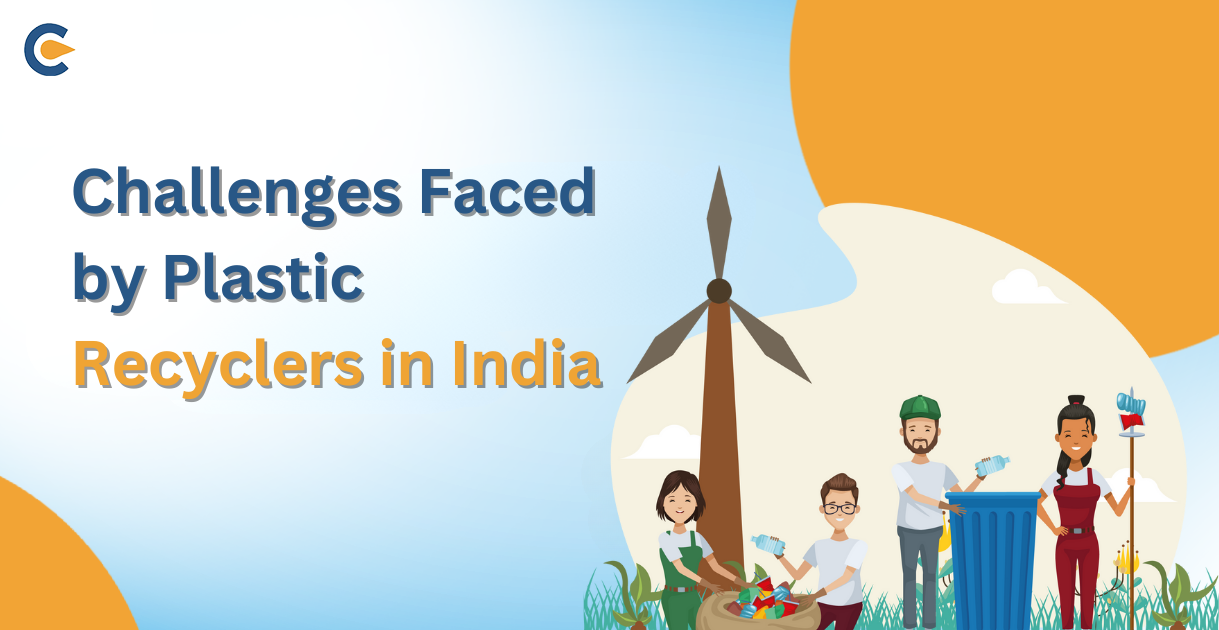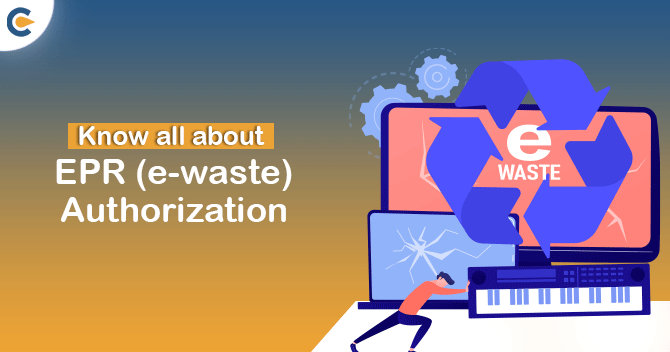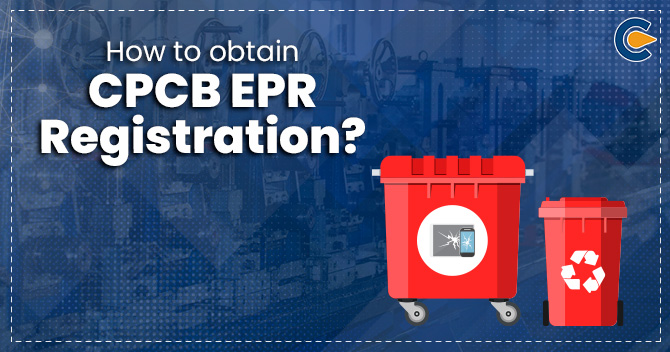Plastic Recyclers in India: Extended Producer Responsibility or EPR is a regulatory framework that originates from the concept of the Polluters Pay Principle, which is a significant development in the domain of environmental protection and sustainable development. The EPR compliance ensure that the producer or manufacturer of a product is aware of the consequences and impact of the product’s lifecycle from manufacturing, import, sale, and distribution to recycling, refurbishing, and disposal.
EPR compliance for recyclers imposes compulsion upon the recycler of plastic waste to comply with all relevant standards of waste management, as laid down in various pollution control laws and regulations in order to receive a valid EPR authorization for continuing his business activity from the authorities.
EPR is necessary for Plastic Recyclers in India. Plastic Waste Processer (PWP) or Recyclers in India requires valid consent from regulatory bodies per the Plastic Waste Management Rules, 2022.
Compliances for Plastic Recyclers in India
Plastic Waste Recyclers in India are covered under the Extended Producer Responsibility or ERP Regime. The stakeholders in the Plastic Waste Management Industry in India are regulated and governed by the Plastic Waste Management Rules, 2016. The Rules and the consolidated framework provide regulations for the disposal and recycling of commercial plastic used in the form of polythene bags, cases, packings, sheets
The Rules and other regulations, such as the specified standards for the thickness and quality of the commercial plastic used, are also made. Plastic recyclers must follow the guidelines laid down under the EPR guidelines of the Ministry of Environment, Forest and Climate Changes (MoEFC).
Central Pollution Control Board and State Pollution Control Board (SPCB) are empowered to lay down the rules and guidelines for plastic waste recyclers, for them to comply with the same. The CPCB designates waste collection centres where harmful plastic waste is segregated, transported, recycled, and repurposed for reuse. EPR aims to minimize pollution to the natural environment caused by improper disposal of plastic waste. All waste producers and recyclers must obtain authorization from the respective central and state authorities to commence waste recycling Activities.
Challenges Faced by Plastic Recyclers
The Plastic Waste Management Rules, 2016 and 2022, lay down the framework for obtaining plastic waste recycling licenses, waste quantities, categories, and recycling procedures. Still, recyclers can face a lot of informal challenges in the country. They are-
Inadequate Infrastructure
Plastic waste recycling is still in the very early stages and requires some major modernization and revamping initiatives. There is an acute inadequacy of Waste recycling and segregation centres. Apart from that, the lack of technology and tools used in waste collection, transportation, recycling, and refurbishing, especially in the case of non-biodegradable waste materials like plastic, is a big concern for the Government and Plastic waste recyclers. Due to the adequacy of infrastructure, plastic recyclers in India often face challenges.
Strict Regulatory Compliance Requirements
To obtain EPR Authorization for plastic waste recyclers, the concerned person or entity has to meet the eligibility criteria laid down by the pollution control board(s). EPR authorization requires the Plastic waste recyclers to complete annual recycling targets. A plastic recycler obtains an EPR Authorization from the Pollution Control Board by submitting all proofs and relevant documents related to compliance with the EPR Standards.
Absence of Expertise
Workers encounter a number of difficulties as a result of inadequate industrial expertise in recycling plastic waste. The working becomes a complex system due to the new equipment and uncertain knowledge. This leads to one of the main challenges in the management of plastic recycling.
Absence of Waste Segregation
The most traditional and basic way of separating plastic waste is by hand sorting it. Before recycling to occur, each form of plastic must be manually separated in underdeveloped nations like India. This results in a sorting process that is inconsistent and inefficient. This is one of the often seen challenges for plastic recyclers in India.
Absence of Compatible Technology
The next major challenge faced by plastic recyclers in India is the lack of compatible technology. Recycling has advanced significantly in a number of nations; however, a lot of nations, particularly developing nations, continue to lag behind in terms of technology. The recycling process’s level is ultimately impacted by less advanced technological sources.
Conclusion
Plastic recyclers in India are required to comply with the EPR registration and other compliance requirements that are necessary to carry out waste management. Plastic waste, being highly non-biodegradable and polluting, poses a severe challenge to stakeholders regarding proper disposal and management. Due to inadequate infrastructure and a lack of modern recycling technologies, plastic waste recyclers are not able to meet the statutory recycling targets.
If you are a plastic waste recycler, transporter or even importer and are engaged in the business of processing plastic waste, you can rely on the quality services of Corpbiz to help you in your EPR Registration process. We also provide comprehensive business strategy services that aid plastic waste recyclers and recycling companies in devising EPR strategies for achieving waste recycling targets, safe transportation of plastic waste, and eco-friendly recycling technologies, among other services.
Frequently Asked Questions (FAQs)
What is EPR Authorization for Plastic Recyclers in India?
EPR authorization certificate certifies environmentally sound practices for plastic waste recyclers in India and other entities in the plastic waste management regime. It is issued by the Central Pollution Control Board (CPCB) after the producer entity has cleared all compliances related to Plastic Waste manufacture.
Who is the nodal agency that issues the EPR Certificate?
The Central Pollution Control Board issues the EPR Certificate of Authorization.
How are Plastic Waste manufacturers and importers governed in India?
Management and Recycling of Plastic waste in India are governed by the Plastic Waste Management Rules, 2016, and Plastic Waste (Handling& Management) Rules, 2016.
Is it mandatory to obtain an EPR Certification?
Yes, for plastic waste manufacturers and importers, it is mandatory to obtain an EPR Certificate.
What are the penalties for non-compliance with the EPR Framework?
If an entity does not have a valid EPR certificate or EPR authorization, then it can lead to a fine of up to Rs. 1 lakh for plastic waste recyclers.
How is Corpbiz beneficial for Plastic Recyclers in India?
Corpbiz provides comprehensive business strategy services that aid plastic waste recyclers and recycling companies in devising EPR strategies for achieving waste recycling targets, safe transportation of plastic waste, and eco-friendly recycling technologies that align with modern recycling techniques.
What is a major problem in plastics recycling?
Plastic is the hardest item to recycle from all the materials in our recycling bins. This is because plastics are made up of several polymer kinds.
Why is it difficult to recycle plastic waste?
Plastic polymers are highly stable, which is why they are so helpful in many applications. However, breaking them apart requires a lot of energy, a significant obstacle to chemical recycling.
What are the challenges of plastic recycling in India?
Littering, source segregation, and a lack of infrastructure for post- handling constitute India's three main issues with regard to plastic waste management. It is challenging to influence behavioural change in India due to the country's wide geographic dispersion as well as its high degree of cultural, traditional, and socioeconomic variety.
Can the challenges faced by plastic recyclers in India be reduced?
Yes, as India is developing at a breakneck pace, the Government is launching many initiatives to overcome these challenges.
Read Our Article: How Indian Startups Are Tackling Plastic Pollution?











